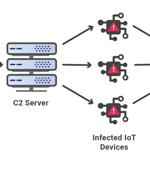Security News

Web infrastructure and website security company Cloudflare on Thursday disclosed that it mitigated the largest ever volumetric distributed denial of service attack recorded to date. "Within seconds, the botnet bombarded the Cloudflare edge with over 330 million attack requests," the company noted, at one point reaching a record high of 17.2 million requests-per-second, making it three times bigger than previously reported HTTP DDoS attacks.

Weaknesses in the implementation of TCP protocol in middleboxes and censorship infrastructure could be weaponized as a vector to stage reflected denial of service amplification attacks against any target, surpassing many of the existing UDP-based amplification factors to date. The research, which received a Distinguished Paper Award at the conference, is the first of its kind to describe a technique to carry out DDoS reflected amplification attacks over the TCP protocol by abusing middlebox misconfigurations in the wild, a method previously deemed effective at preventing such spoofing attacks.

Second quarter blocked DDoS attack volumes were up more than 40% compared to the same period in 2020, a Radware report reveals. The report provides an overview of DDoS attack trends by industry, as well as across applications and attack types.

DDoS attacks are a nuisance to be sure, but they're also used in a variety of ways that make them a severe threat, says Atlas VPN. DDoS attack data presented by Atlas VPN found that attackers prefer the United States and the computers and internet sectors as targets. In June 2021 alone, more than a third of DDoS attacks worldwide targeted servers in the U.S. DDoS attacks involve using a massive number of internet-connected machines and devices to flood a target server, rendering it unable to keep up with traffic and either making it unusable or taking it offline.

Kaspersky's quarterly DDoS attack report is one that its writers describe as "Relatively calm," but don't let that statement fool you: There's still a lot of dangerous DDoS threats and new actors waiting for their time to strike. The expected calm doesn't mean there's time to take a break: Cybercriminals definitely aren't, with Kaspersky reporting two new potential DDoS attack vectors and a rise in DDoS attacks as a ransomware tool.

Corero Network Security announces additional flexibility when deploying its SmartWall solution, with a new Edge Threat Defense capability. Corero's mission is to make the internet a safer and more reliable place to do business by protecting against the downtime and disruption caused by DDoS attacks.

The report investigates changes in attack vector, size and frequency, and reveals a staggering 50% increase in peak attack traffic compared to 2019, with a jump to 1.18 Terabytes per Second or 887 Mega Packets Per Second. During the same period, the average size of a DDoS attack was 19 Gbps, with an average duration of 10 minutes.

There has been a 33% increase in the number of DDoS attacks in H1 2021, according to a report published by Link11. The report also found that between Q1 2021 and Q2 2021 there was a 19% increase in DDoS campaigns, some of which were over 100 Gbps in attack volume; further evidence that hackers are continuing to exploit the vulnerabilities of businesses during the pandemic.

A British script kiddie who DDoS'd a Labour Party parliamentary candidate's website in the runup to the last general election has been banned from using the Tor browser. Bradley Niblock, formerly the operator of the UGLegion Twitter account, pleaded guilty to two Computer Misuse Act crimes after being tracked down by Cumbria Police.

CDN, cybersecurity and cloud services provider Akamai has blamed an outage that occurred on Thursday on an issue with its Prolexic DDoS attack protection service. Akamai's Prolexic Routed is a fully managed service designed to protect an organization's online assets against distributed denial-of-service attacks.